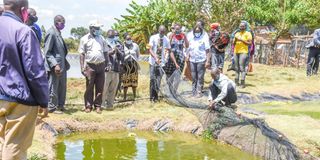Premium
Fish farming extended me the lifeline I needed

Ismael Kipkemei (left) and his friend catch fish at one of the ponds at their home in Uasin Gishu County as guests look on. The county is encouraging more people to venture into fish farming.
What you need to know:
- Today, the 19-year-old is reaping handsome returns from the venture, which he established in March last year with a capital of Sh10,000.
- That initial investment made him Sh50,000, motivating him to construct two more fish ponds, he then stocked 1,000 catfish and 2,000 tilapia.
- To purify the water, he introduces the water cabbage in the pond, which acts as a water purifier and also food for the fish.
- With 400 fish ponds each producing 250 kilos of fish annually, the total production was approximately 100,000kgs, valued at Sh30million.
When Ismael Kipkemei fell ill two years ago, forcing him to drop out of school in Form Three, he felt hopeless, afraid that he would be financially dependent for the rest of his life.
And then his mother took him with her to visit a friend that farmed chicken and fish. He was so inspired by the fish venture, that when he got better, he decided to try his hand at fish farming.
Today, the 19-year-old is reaping handsome returns from the venture, which he established in March last year with a capital of Sh10,000.
With this amount, he constructed a fish pond, starting with 250 tilapia fingerlings - he runs the farming venture in a small portion of his family’s farm in Sergoit, Moiben constituency.
That initial investment made him Sh50,000, motivating him to construct two more fish ponds, he then stocked 1,000 catfish and 2,000 tilapia.
At the moment, he has 5,000 tilapia and catfish in four fish ponds. He supplies his fish to the county fisheries who sell the fish on his behalf.
Catfish, he explains, take four months to grow to maturity while tilapia take between six to eight months. The price of tilapia ranges between Sh100 to Sh600 depending on the weight, while catfish can fetch between Sh600 to Sh1,000.
“I feed my fish with dried omena and fish pellets, cabbage and green vegetables to cut on expenses. Fish farming is not labour intensive and is rewarding, also, you don’t require a large space, you can even use a container to rear the fish,” he explains.
Growing demand
He sources water from an adjacent dam – pond water is drained every three months to ensure that the environment is conducive for the fish, failure to do this and you may end up losing your fish stock.
To purify the water, he introduces the water cabbage in the pond, which acts as a water purifier and also food for the fish.
“It traps waste products, ensuring that there is no foul smell coming from your pond,” says Kipkemei, who holds a certificate in Fisheries Technology from Baraka Agricultural College in Nakuru.
In five years’ time, he targets to farm over 20,000 fish at any given time to tap on the growing demand for fish in the country.
Uasin Gishu County has embarked on several initiatives to woo local farmers into fish farming to meet the growing demand in the region and tackle malnutrition.
CEC Member for Agriculture, Livestock Development & Fisheries, Samuel Yego, says that the county is encouraging farmers to engage in fish farming besides traditional crops such as maize and wheat.
Modern technologies
“We are targeting to ensure that each individual in our county will consume at least 10 kilogrammes of fish annually, the aim to boost income from fish farming and boost nutrition among our people,” said Mr Yego, noting that the devolved unit was providing 470,000 fingerlings at a subsidised cost this year to shore up local fish production in the 600 fish ponds and dams across the county.
The county also has demonstration farms in all sub-counties to teach farmers new farming technologies.
The number of ponds before the onset of devolution had dropped by nearly half due to the high cost of feeds and lack of knowledge among locals on how to manage them.
With 400 fish ponds each producing 250 kilos of fish annually, the total production was approximately 100,000kgs, valued at Sh30million.
Production has since increased from 100,000 kilos to over 330,000 kilos annually, valued at Sh150 million, thanks to rising demand for fish.
To further encourage more fish consumption, the devolved unit also conducts weekly ‘eat-more-fish’ campaigns (Fish Friday) where the farmers are taught how to use modern technologies to farm.
“We are also promoting other modern technologies such as aquaponics and biofloc technologies aimed at increasing production and productivity as well as cut down on the cost of feeding, thus increasing profits in fish farming,” added the official.
While an aquaculture project started under the Economic Stimulus Package (ESP) in 2009 collapsed, the current initiative seeks to revive it.
The country’s fish production then had grown from a meagre 2,000 metric tonnes to 70,000 metric tonnes thanks to aquaculture, but production took a nosedive.





